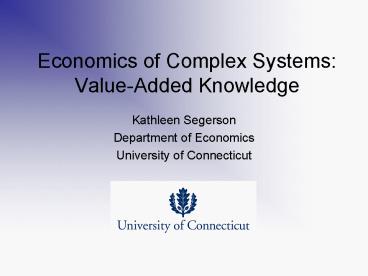Economics of Complex Systems: ValueAdded Knowledge - PowerPoint PPT Presentation
1 / 23
Title:
Economics of Complex Systems: ValueAdded Knowledge
Description:
'study of allocating scarce resources among competing ends' study of making decisions ... Irrelevance of 'sunk' costs. Concept of economic benefits ... – PowerPoint PPT presentation
Number of Views:36
Avg rating:3.0/5.0
Title: Economics of Complex Systems: ValueAdded Knowledge
1
Economics of Complex Systems Value-Added
Knowledge
- Kathleen Segerson
- Department of Economics
- University of Connecticut
2
- Economics ? commercial viability
- (cost of production, marketability)
3
- Economics
- study of allocating scarce resources among
competing ends - study of making decisions
4
Thinking like an EconomistKey Economic
Principles/Concepts
- Explanation/Prediction vs. Evaluation
- Tradeoffs
- Optimization
- Behavior
- Incentives
- Prices and markets
- Externalities
- Economic efficiency
5
Explanation/Prediction vs. Evaluation
- Explanation/Prediction of behavior
- How do people make decisions about.?
- What would be the impact of ?
- Micro vs. macro-level analysis
- Evaluation (of outcomes/policies)
- Criteria for ranking?
- Economic efficiency
- Distributional considerations
- Importance of behavioral responses
6
Focus on Tradeoffs More of one thing means less
of something else
- Types of tradeoffs
- Tradeoffs we have to make (based on technological
feasibility or resource constraints) ? costs - Tradeoffs we are willing to make (based on human
values and likes/dislikes) ? benefits - Can be for individuals or society as a whole
7
Tradeoffs ? benefits and costs
- Important distinctions
- Who bears costs and benefits?
- Private vs. social costs/benefits
- Economic costs vs. engineering/accounting costs
- Economic benefits vs. commercial benefits vs.
impacts
8
Who bears costs and benefits?
- Internalized benefits and costs
- Intra-generational distribution (e.g., new
technology can benefit some at expense of others) - Inter-generational distribution (e.g., new
technology can benefit one generation at expense
of another generation)
9
Private vs. Social Costs/Benefits
- Examples
- Redistributive taxes
- Price paid for a carbon allowance
- Externalities
10
Concept of economic cost
- Economic cost opportunity cost what is
given up to get something - Examples opportunity cost of time
- cost of a dam
- Irrelevance of sunk costs
11
Concept of economic benefits
- Benefit what you would be willing to give up to
get more of something (willingness to pay) - Can apply to a market or non-market good or
service (e.g., environmental quality, species
preservation) - Basic concept
- U(Income,Q1)U(Income-WTP,Q2)
12
Benefits ? Impacts
- Examples
- Tax revenue
- Jobs
- More jobs isnt always better (e.g., low
productivity) - Projects that create jobs dont necessarily
generate economic benefits (e.g., cleanup of
spill) - Technologies that displace jobs dont necessarily
involve negative benefits (costs)
13
Valuing outputs vs. inputs
- Technology/production function yf(K,L,R)
- Inputs (K,L,R) ? Output (y)
- Revenue from sale of output ? payments to inputs
(dividend, wages, payments to suppliers, taxes)
14
Benefits as cost savings
- When output is the same, benefit can be measured
as reduction in cost of producing that output - e.g., benefit of trade part of cap-and-trade
15
Economic approach to human decisions optimization
- Basic premise people make choices to maximize
their well-being (broadly defined) ? they respond
to benefits and costs - Optimization ? Balancing and the Marginal
principle choose X where - marginal benefit marginal cost
16
Behavior Matters
- Need to consider behavioral responses
(adaptation) when - Predicting outcomes
- Measuring benefits and costs
- Example Effect of climate change on
agricultural output - yf(T,x), but xx(T)
17
Behavior responds to incentives
- Two types of incentives
- Positive Increase (marginal) benefit
- Negative Increase (marginal) cost
- Link to unintended consequences
- Important tool for changing outcomes
- Link to technological fixes?
- Alternative solution?
- Adoption incentives?
18
Prices and Markets
- Prices create incentives
- High price ?
- Incentive to consume less
- Incentive to produce more
- Low price ?
- Incentive to consume more
- Incentive to produce less
- Prices are established through
- Markets (supply demand)
- Policies (e.g., carbon tax)
19
Externalities
- Actions of one party (e.g., individual or firm)
unintentionally harm (or benefit) another - Problem Lack of price/market for some good or
service - Example Clean Air
- Unpriced input ? consume too much
- Unpriced output ? produce too little
20
Economic Efficiency
- Efficiency getting the most out of available
resources - maximizing net benefits to society as a whole
- Balancing of benefits and costs
- Result Can think, e.g., about an efficient
amount of pollution
21
Applying principles to complex systemsLinked
human/environmental systems
- Basic principles hold, but it can be very
difficult to - Predict behavioral responses
- Measure benefits and costs
22
Example Biofuels
- Problem Dependence on foreign oil and GHG
emissions from fossil fuels - Solution Increased use of biofuels
- Questions
- Effect of policies to promote corn-based ethanol?
- Could effects have been anticipated with a more
holistic approach?
23
- Policy ? increased demand for corn for ethanol ?
price of corn (all uses) - ? increase price of grains ? increase food prices
- ? switch land from soybeans to corn ? decrease
supply of soybeans ? increase price of soybeans ?
increase food prices - ? increase land in corn production ? increase use
of fertilizer ? increase runoff, e.g., into
Mississippi River and Gulf of Mexico ? increase
hypoxia zone in Gulf ? impact on shrimp (?) or
other impacts - ? clearing of carbon-rich habitats (e.g.,
rainforests in Brazil, or land in CRP) (?) to
produce more corn ? net increase in GHG emissions
(?)































